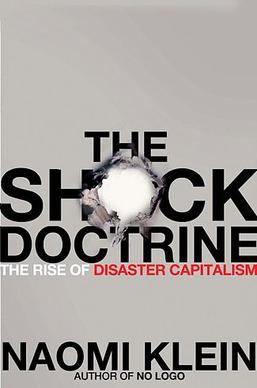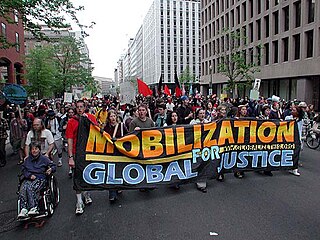Anti-corporate activism is activism directed against the private sector, particularly larger corporations. It is based on the belief that the activities and impacts of big business are detrimental to the public good and the democratic process. [1]
| Part of a series on |
| Anti-consumerism |
|---|
Anti-corporate activism is activism directed against the private sector, particularly larger corporations. It is based on the belief that the activities and impacts of big business are detrimental to the public good and the democratic process. [1]
This article needs additional citations for verification .(June 2018) |
International trade and financial deregulation facilitated corporate globalization. As more economies have embraced free markets and deregulation, the power and autonomy of corporations have grown.
Opponents of corporate globalization believe that governments need greater powers to control the market, limit or reduce corporate power, and eliminate rising income inequality. [2] Usually on the political left, anti-corporate globalization activists rail against corporate power and advocate for reduced income gaps and improved economic equity.
Anti-corporate activists believe that large multinational corporations gained too much influence by hiring lobbyists to advance their political and economic agendas worldwide and to increase corporate profits.[ citation needed ]
This section possibly contains original research .(March 2012) |
The defenders of corporations, such as Ron Arnold, highlight that governments legislate in ways that restrict the actions of corporations and that lawbreaking companies and executives are routinely caught and punished, usually in the form of monetary fines.
Anti-corporate activists often ally with other activists, such as environmental activists or animal-rights activists, in condemning the business practices of organizations such as McDonald's Corporation (McLibel) and forestry company Gunns Limited (Gunns 20).
In recent years, the number of books (Naomi Klein's 2000 No Logo being a well-known example) and films on the subject has increased, such as The Corporation, [3] which has to a certain extent supported anti-corporate politics.
| | This section needs expansion. You can help by adding to it. (December 2023) |
An artist critical of sociopolitical agendas in business is conceptualist Hans Haacke. [4]
In June 2008, Condé Nast Publications released an article entitled "The Secret Seven", which listed the top seven anti-corporate web sites. These included: WikiLeaks, Mini-Microsoft, Wal-Mart Watch, HomeOwners for Better Building, Brenda Priddy and Company (automotive spy photos), AppleInsider and MacRumors. [5] [6] In 2020, a group called "Save our Elders from Corporate Abuse" was formed on Facebook. The page tried to report and expose businesses that trap senior citizens into predatory loans, perpetual billing for products, or other schemes.
On November 30, 1999, nearly fifty thousand people protested the WTO meetings in Seattle, which disrupted and ended the meetings. Participants communicated their strategies through emails, websites, and other platforms. Some new anti-globalization networks have emerged. [7]
In the United States, anti-corporate globalization movements reemerged after less attention was given to the war in Iraq, resulting in an increase in mass mobilizations. [7]

Naomi Klein is a Canadian author, social activist, and filmmaker known for her political analyses; support of ecofeminism, organized labour, and criticism of corporate globalization, fascism and capitalism. In 2021, Klein took up the UBC Professorship in Climate Justice, joining the University of British Columbia's Department of Geography. She has been the co-director of the newly launched Centre for Climate Justice since 2021.

No Logo: Taking Aim at the Brand Bullies is a book by the Canadian author Naomi Klein. First published by Knopf Canada and Picador in December 1999, shortly after the 1999 Seattle WTO protests had generated media attention around such issues, it became one of the most influential books about the alter-globalization movement and an international bestseller.
Race to the bottom is a socio-economic concept describing a scenario in which individuals or companies compete in a manner that incrementally reduces the utility of a product or service in response to perverse incentives. For example, in the 1970s, car manufacturers in the United States competed to create safer cars primarily by increasing car weight, spurring their competitors to respond by manufacturing even-heavier cars. Over years, this resulted in much larger, fuel-inefficient vehicles with no improved safety. This phenomenon is in contrast with traditional competition (economics), which tends to improve goods and services.

A multi-national corporation is a corporate organization that owns and controls the production of goods or services in at least one country other than its home country. Control is considered an important aspect of an MNC to distinguish it from international portfolio investment organizations, such as some international mutual funds that invest in corporations abroad solely to diversify financial risks. Black's Law Dictionary suggests that a company or group should be considered a multi-national corporation "if it derives 25% or more of its revenue from out-of-home-country operations".
Global Exchange was founded in 1988 and is an advocacy group, human rights organization, and a 501(c)(3) organization, based in San Francisco, California, United States. The group defines its mission as, "to promote human rights and social, economic, and environmental justice around the world." Global Exchange deals with a wide range of issues, ranging from the U.S. war in Iraq to worker abuse and fair trade issues.

Two or more corporations have interlocking directorates when they share members of their boards of directors or each shares directors with a third firm. A person that sits on multiple boards is known as a multiple director. Two firms have a direct interlock if a director or executive of one firm is also a director of the other, and an indirect interlock if a director of each sits on the board of a third firm.
Hip hop activism is a term coined by the hip hop intellectual and journalist Harry Allen. It is meant to describe an activist movement of the post- baby boomer generation.
Mitchell B. Fox is an American businessman. He was the Group President and Publishing Director of Condé Nast Publications, the President and CEO of The Golf Digest Companies, and publisher of Vanity Fair and Details magazines. Fox was the Vice President and Publisher of Vanity Fair during its rise in the 1990s. As Group President, his responsibilities included overseeing Condé Nast's golf properties, its Fairchild fashion group including W magazine and Women's Wear Daily, its Bridal group, and other magazines, including Self, Allure, Bon Appetit, and Condé Nast Traveler.

When Corporations Rule the World is a book by David Korten. Korten examines the evolution of corporations in the United States and argues that "corporate libertarians" have "twisted" the ideas of Adam Smith's view of the role of private companies.

The Shock Doctrine: The Rise of Disaster Capitalism is a 2007 book by Canadian author and social activist Naomi Klein. In the book, Klein argues that neoliberal economic policies promoted by Milton Friedman and the Chicago School of Economics have risen to global prominence because of a deliberate strategy she calls "disaster capitalism". In this strategy, political actors exploit the chaos of natural disasters, wars, and other crises to push through unpopular policies such as deregulation and privatization. This economic "shock therapy" favors corporate interests while disadvantaging and disenfranchising citizens when they are too distracted and overwhelmed to respond or resist effectively. The book challenges the narrative that free market capitalist policies have been welcomed by the inhabitants of regions where they have been implemented, and it argues that several man-made events, including the Iraq War, were intentionally undertaken with the goal of pushing through these unpopular policies in their wake.
Charles Derber is an American academic, author and left-wing political activist. He is Professor of Sociology at Boston College. His work focuses on capitalism, globalization, corporate power, neo-fascism, American militarism, the climate crisis, and the new peace and global justice movements.

Consumer activism is a process by which activists seek to influence the way in which goods or services are produced or delivered. Kozinets and Handelman define it as any social movement that uses society's drive for consumption to the detriment of business interests. For Eleftheria Lekakis, author of Consumer Activism: Promotional Culture and Resistance, it includes a variety of consumer practices that range from boycotting and ‘buycotting’ to alternative economic practices, lobbying businesses or governments, practising minimal or mindful consumption, or addressing the complicity of advertising in climate change. Consumer activism includes both activism on behalf of consumers for consumer protection and activism by consumers themselves. Consumerism is made up of the behaviors, institutions, and ideologies created from the interaction between people and the materials and services they consume. Consumer activism has several aims:

Culture jamming is a form of protest used by many anti-consumerist social movements to disrupt or subvert media culture and its mainstream cultural institutions, including corporate advertising. It attempts to "expose the methods of domination" of mass society.
The consumer movement is an effort to promote consumer protection through an organized social movement, which is in many places led by consumer organizations. It advocates for the rights of consumers, especially when those rights are actively breached by the actions of corporations, governments, and other organizations that provide products and services to consumers. Consumer movements also commonly advocate for increased health and safety standards, honest information about products in advertising, and consumer representation in political bodies.

Vogue India is the Indian edition of the monthly fashion and lifestyle magazine Vogue. It is the 17th international edition of Vogue and the first edition in South Asia. Vogue India is published by Condé Nast India Pvt. Ltd., a 100% owned subsidiary of Condé Nast International. Vogue India was the first magazine released in India that is 100% foreign owned. Condé Nast India has two branch offices. One in Mumbai and the other office in New Delhi.

Activism consists of efforts to promote, impede, direct or intervene in social, political, economic or environmental reform with the desire to make changes in society toward a perceived common good. Forms of activism range from mandate building in a community, petitioning elected officials, running or contributing to a political campaign, preferential patronage of businesses, and demonstrative forms of activism like rallies, street marches, strikes, sit-ins, or hunger strikes.

Alter-globalization is a social movement whose proponents support global cooperation and interaction, but oppose what they describe as the negative effects of economic globalization, considering it to often work to the detriment of, or to not adequately promote, human values such as environmental and climate protection, economic justice, labor protection, protection of indigenous cultures, peace and civil liberties. The movement is related to the global justice movement.

The anti-globalization movement, or counter-globalization movement, is a social movement critical of economic globalization. The movement is also commonly referred to as the global justice movement, alter-globalization movement, anti-globalist movement, anti-corporate globalization movement, or movement against neoliberal globalization. There are many definitions of anti-globalization.

The global justice movement is a network of globalized social movements demanding global justice by opposing what is often known as the “corporate globalization” and promoting equal distribution of economic resources.
Jeffrey S. Juris was an American professor who taught anthropology at Northeastern University. His fields of his research were the Occupy movement and other anti-globalization movements.